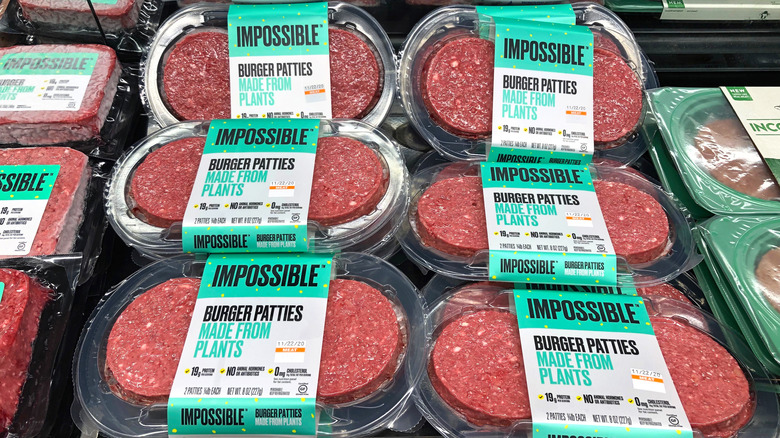How The Fat Content Of Impossible Burgers Compares To Real Beef
For a while, plant-based meats seemed poised to take over the world. Brands like Impossible Burger promised an alternative meat that looked, tasted, and even bled like real beef — even though it was made with plant protein. Because these alternative meat products are plant-based, you might think that they're more nutritious compared to beef. However, in terms of a certain type of fat, an Impossible Burger might be nearly identical to your ground beef patty.
While an Impossible Burger might have less total fat content than your regular burger patty, the key is comparing the saturated fat amounts in Impossible Burger with common grinds of ground beef. According to Harvard Medical School, too much saturated fat in your diet can increase the amount of bad cholesterol in your body and might potentially be linked to health problems like stroke or heart disease.
A 80/20 grind of raw beef will have around 2.1 grams of saturated fat per ounce, while a 85/15 grind will have about 1.6 grams of saturated fat per ounce. The most recent version of the Impossible Burger has about 1.5 grams of saturated fat per ounce, making it virtually the same, in this aspect, as your 85% lean beef burger.
Impossible Burgers and real beef have similar saturated fat content
Overall, these meat alternatives are more generally more processed. Additionally, the plant-based product trails normal beef when it comes to sodium content. An Impossible Burger patty has between four to five times more milligrams of sodium than your ground beef patty. This is a point of concern because, per the FDA, higher sodium diets are associated with an increased risk of developing high blood pressure, which is a risk factor for other health complications.
More positively, the Impossible Burger can be a great source of protein, vitamins, and minerals, including those not typically found in animal products. The plant-based patties even boast fewer calories and total fat as your typical burger and don't have cholesterol, which is only found in animal products. The Washington Post also notes that from a climate perspective, plant-based meats produce 40% to 90% less greenhouse gas emissions than traditional meats.
The bottom line is that just because a product is plant-based doesn't mean that it's necessarily better or worse than beef when considering the fat content of both. But there are many reasons why someone might choose these alternative meats since plant-based products have the potential to be a great vehicle for nutrition, reduce our carbon footprint on the planet, and taste very close to the real deal meat.

